British Semi-Longhair is originated from United Kingdom but Viverral is originated from United States. Both British Semi-Longhair and Viverral are having almost same weight. Both British Semi-Longhair and Viverral has almost same life span. Both British Semi-Longhair and Viverral has same litter size. British Semi-Longhair requires Moderate Maintenance. But Viverral requires Low Maintenance
Basic Information
undefined
United Kingdom
United States
Life Span:
10 - 14 Years
10 - 15 Years
Colors Available:
chocolate, blue and colors can be solid, cream, Colors can be white, ticked or bi-colored.
Cream, black, tan - spots
Coat:
Semi-long, silky and dense
Short and plush
Temperament:
Affectionate, Alert, Cheerful, Curious, Docile, Energetic, Friendly, Gentle, Independent, Intelligent, Lively, Loving, Loyal, Playful, Responsive, Social, Sweet, Territorial
Affectionate, Aggressive, Alert, Cheerful, Curious, Energetic, Friendly, Independent, Intelligent, Lively, Loving, Loyal, Outgoing, Playful, Responsive, Social, Stubborn, Territorial
Grooming:
Moderate Maintenance
Low Maintenance
New Owners Friendly:
Yes
Yes
History
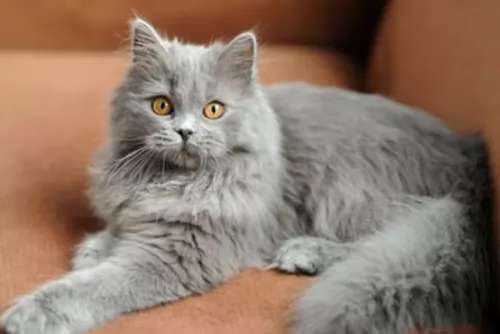 The British semi-Longhair cat is exactly like the British Shorthair except when it comes to the coat length - the hair is longer.
The British semi-Longhair cat is exactly like the British Shorthair except when it comes to the coat length - the hair is longer.
During the 20th century, a short-haired version of the modern Persian was developed and it was then proposed that a long-haired cat of the British type make it into the cat fancy.
The British Shorthair cat was bred with different Persian cat breeds which then resulted in a cat that looked like the British Shorthair cat, just with longer hair. It is recognized separately in the United States of America but considered one and the same as the short hair in the United Kingdom.
This is a rare cat breed and therefore not much information on it is available.
It does seem that in 2002, a 5th generation Viverral was developed and this established the breed.
The cat is described as a fishing cat hybrid. A breeding program was started but it is thought that the cat became extinct.
Description
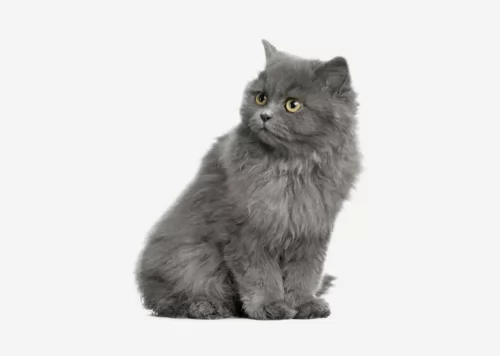 The British Semi-longhair can become quite a large cat really and is described as a medium to large cat. In fact, a full-grown British Semi-Longhair can grow to be about 7.5kg in weight.
The British Semi-longhair can become quite a large cat really and is described as a medium to large cat. In fact, a full-grown British Semi-Longhair can grow to be about 7.5kg in weight.
They’re compact and robust with short, strong legs. The longish coat can be in all colors and patterns and he sheds moderately. Color can be white, cream, chocolate, blue and colors can be solid, ticked or bi-colored.
The ears are wide-spaced and medium-sized and they eyes are almond-shaped and match the color of its coat.
Temperament:
The British Semi-Longhair cat is such an easy-going pussycat while being reserved, independent and undemanding. He will get on with children and other pets in the home. Perhaps he suits someone who loves the idea of having a gorgeous pet around, but who is working and doesn’t have that amount of time to devote to a cat.
The British semi-longhair is one of those cats that doesn’t mind too much if you disappear to work each day. He can amuse himself without you during that time, as long as he has some nice toys and a nice environment to chill.
It’s not the kind of cat to follow you around, making it perfect for anyone who doesn’t have the time to give the cat too much attention. It’s simply not a lap-cat.
The cat isn’t very active at all and is more than happy to sit in his favorite spot in the sun and to watch activities from there. This is a quiet, content cat, not wanting to meow unnecessarily and his round face shows off a happy disposition.
The Viverral is muscular and substantial. He has a smallish head and smallish ears with a thick tail.
The coat is spotted. The base color of the coat and the spots should be different. The light cream underbelly is also spotted.
Large, muscular, and solid, the cat’s eyes are big and round in the smallish heald. The coat is short and plush with a spotted pattern of black, brown or tan spots.
Temperament:
The Viverral cat has been designed to produce friendly kittens that are curious and confident. They turn out strong and confident and are suitable as house cats.
New cat owners might have success with them and they can even be friendly with children in the home, but the truth remains, they are unpredictable.
Beautiful and something unique, it is not likely though that this cat breed would have wanted to be cuddled and petted by his human owners.
Characteristics
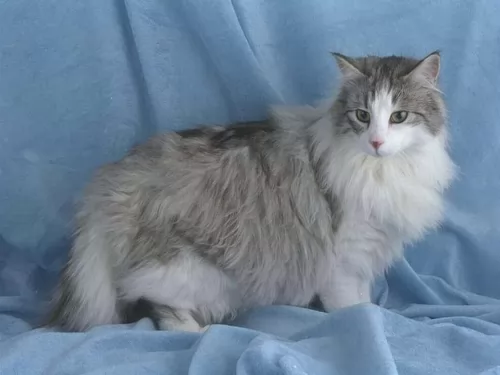 This moderately shedding cat is such a balanced cat – it is good with everyone, is quiet and unassuming. It just quietly gets on with life, being content and satisfied with its lot.
This moderately shedding cat is such a balanced cat – it is good with everyone, is quiet and unassuming. It just quietly gets on with life, being content and satisfied with its lot.
If you’re looking for a more ‘involved’, vocal, active cat, the British semi-longhair isn’t for you. If you however, want a quiet, steady presence in your home, this lovely cat is for you.
Hybrid cats such as the Viverral can look quite a bit like a wild cat and this is what first appeals to cat lovers. They want an exotic cat to brag about.
However, these cats can come up with a whole lot of behavioral problems so that you wish you had never got one. One should just go along to some of the many cat shelters there are to discover how many hybrid cats land up there.
They turned out to be a disappointment – their behavior wouldn’t conform to what their human family expected of them. This is the story of hybrid cats. Humans want some exotic looking animal to please their greedy natures and then when the cats don’t behave the way they should, they get rid of them. Rather, it is humans that need to change their behavior and leave wild animals alone.
The Viverral can have their good side and be splendid pets but they aren’t consistent. They have a streak of unpredictability, and they also have issues with the use of a litter box.
They mark their territory too and can show some aggression. Any animal with a wild side isn’t going to make the best pet, but still, some cat lovers have managed to bring out their best side.
Health Problems
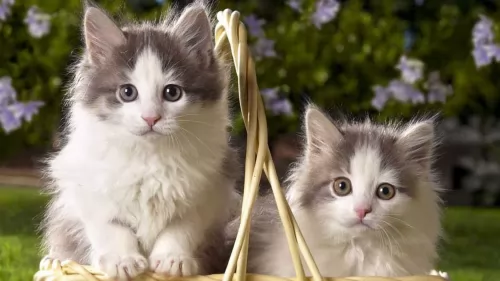 Your British semi-longhair is quite healthy, but it does come with a few issues, and this is suffering with renal and kidney diseases – more so than with other cat breeds.
Your British semi-longhair is quite healthy, but it does come with a few issues, and this is suffering with renal and kidney diseases – more so than with other cat breeds.
It can also battle with hypertrophic cardiomyopathy, a type of heart disease often found in cats.
The development of hybrid cats began as a scientific effort in the 1970s. Hybrid pets can be aggressive and also solitary.
Hybrid cats are an unnatural breeding. They are cat species that weren’t meant to mate in the first place. Breeders tell stories of premature births and also aborted pregnancies.
Some of the more common illnesses among hybrid cats include digestive issues. Also, vaccinations used to protect our domestic cats from disease have not been approved for use in hybrid animals.
A hybrid cat has a wild side to him. These cats were bred to look like a wild cat, and although they are healthy, they can also have some health issues.
Ensuring the cat has a proper diet will contribute more to better health. As mentioned, some of these cats can battle with the likes of chronic diarrhea and irritable bowel disease and also battle with intestinal parasite issues.
Caring The Pet
Grooming:
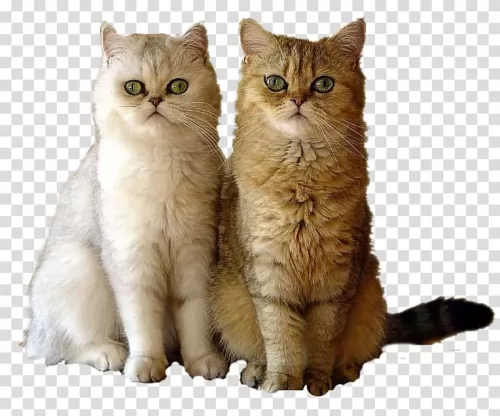 Because of the semi-longhair, the British Semi-Longhair will require more effort than short hair cats with keeping the coat free of tangling. It’s a good idea to get this cat used to a brush-session to free the coat of dust and loose hairs at least once or twice a week.
Because of the semi-longhair, the British Semi-Longhair will require more effort than short hair cats with keeping the coat free of tangling. It’s a good idea to get this cat used to a brush-session to free the coat of dust and loose hairs at least once or twice a week.
Other basic grooming requirements for your kitty kat would be to keep the claws short, to check inside the mouth for dental problems, to check inside the ears for dirt and redness and to check the eyes to make sure they’re bright and clear. If there is a discharge, wipe the eyes gently with warm water and some apple cider vinegar. Be very gentle with all your grooming processes for your cat.
Diet:
The British semi-Longhair enjoys his food and if you don’t feed him in a responsible manner he can become obese. He is such a beautiful cat this that you want to ensure he gets the best premium quality food there is – food that is high in proteins.
It’s not worth feeding your beautiful semi-longhair on inferior foods as this can impair his health.
Cats are carnivores – related to lions – they’re meat-eaters. As far as their diet is concerned, they need fats and proteins and not carbs.
When you’re choosing food for your British semi-Longhair, check out the label to make sure you know precisely what your cat is taking in. When you are 100% sure that the food is the best it can be and your cat loves it, give it to him.
Don’t change foods haphazardly, as this cat likes a lifestyle devoid of sudden changes. If in any doubt, get advice from your vet on weight and calorie intake for your pet.
These are different cats to your regular domestic cat, and they will require different care. One of the things you need to do for a cat like this is provide it with an outdoor enclosure.
Because of their wild side, they are longing to be outdoors and you may find it difficult integrating such a cat into your home.
The Viverral needs plenty of exercise but you can’t just let them roam freely outdoors. Yes, you can train them to walk with a leash but you need to allow him outside in the enclosure. You can include a shallow paddling pool for him too.
These are active, intelligent cats and you will need to invest in some interactive toys for him to keep him amused.
You will need to supply this cat with a scratching post and a climbing tree. This is because as a cat, he is a natural climber and scratcher and he will need these in his life.
Ensure your feline pet has a nice warm, dry place to sleep.
Comparison with other breeds
- British Semi-Longhair vs Abyssinian - Breed Comparison
- British Semi-Longhair vs Aegean - Breed Comparison
- British Semi-Longhair vs African Serval - Breed Comparison
- British Semi-Longhair vs Chausie - Breed Comparison
- British Semi-Longhair vs American Bobtail - Breed Comparison
- British Semi-Longhair vs American Curl - Breed Comparison
- British Semi-Longhair vs American Keuda - Breed Comparison
- British Semi-Longhair vs American Longhair - Breed Comparison
- British Semi-Longhair vs American Polydactyl - Breed Comparison
- British Semi-Longhair vs American Shorthair - Breed Comparison
- British Semi-Longhair vs American Wirehair - Breed Comparison
- British Semi-Longhair vs Applehead Siamese - Breed Comparison
- British Semi-Longhair vs Ashera - Breed Comparison
- British Semi-Longhair vs Asian - Breed Comparison
- British Semi-Longhair vs Asian Semi-Longhair - Breed Comparison
- British Semi-Longhair vs Australian Mist - Breed Comparison
- British Semi-Longhair vs Balinese - Breed Comparison
- British Semi-Longhair vs Bengal - Breed Comparison
- British Semi-Longhair vs Bicolor - Breed Comparison
- British Semi-Longhair vs Birman - Breed Comparison
- British Semi-Longhair vs Blue Russian - Breed Comparison
- British Semi-Longhair vs Bombay - Breed Comparison
- British Semi-Longhair vs Brazilian Shorthair - Breed Comparison
- British Semi-Longhair vs Bristol - Breed Comparison
- British Semi-Longhair vs British Longhair - Breed Comparison
- Viverral vs Abyssinian - Breed Comparison
- Viverral vs Aegean - Breed Comparison
- Viverral vs African Serval - Breed Comparison
- Viverral vs Chausie - Breed Comparison
- Viverral vs American Bobtail - Breed Comparison
- Viverral vs American Curl - Breed Comparison
- Viverral vs American Keuda - Breed Comparison
- Viverral vs American Longhair - Breed Comparison
- Viverral vs American Polydactyl - Breed Comparison
- Viverral vs American Shorthair - Breed Comparison
- Viverral vs American Wirehair - Breed Comparison
- Viverral vs Applehead Siamese - Breed Comparison
- Viverral vs Ashera - Breed Comparison
- Viverral vs Asian - Breed Comparison
- Viverral vs Asian Semi-Longhair - Breed Comparison
- Viverral vs Australian Mist - Breed Comparison
- Viverral vs Balinese - Breed Comparison
- Viverral vs Bengal - Breed Comparison
- Viverral vs Bicolor - Breed Comparison
- Viverral vs Birman - Breed Comparison
- Viverral vs Blue Russian - Breed Comparison
- Viverral vs Bombay - Breed Comparison
- Viverral vs Brazilian Shorthair - Breed Comparison
- Viverral vs Bristol - Breed Comparison
- Viverral vs British Longhair - Breed Comparison
 Petzlover
Petzlover The British semi-Longhair cat is exactly like the British Shorthair except when it comes to the coat length - the hair is longer.
The British semi-Longhair cat is exactly like the British Shorthair except when it comes to the coat length - the hair is longer. The British Semi-longhair can become quite a large cat really and is described as a medium to large cat. In fact, a full-grown British Semi-Longhair can grow to be about 7.5kg in weight.
The British Semi-longhair can become quite a large cat really and is described as a medium to large cat. In fact, a full-grown British Semi-Longhair can grow to be about 7.5kg in weight. This moderately shedding cat is such a balanced cat – it is good with everyone, is quiet and unassuming. It just quietly gets on with life, being content and satisfied with its lot.
This moderately shedding cat is such a balanced cat – it is good with everyone, is quiet and unassuming. It just quietly gets on with life, being content and satisfied with its lot. Because of the semi-longhair, the British Semi-Longhair will require more effort than short hair cats with keeping the coat free of tangling. It’s a good idea to get this cat used to a brush-session to free the coat of dust and loose hairs at least once or twice a week.
Because of the semi-longhair, the British Semi-Longhair will require more effort than short hair cats with keeping the coat free of tangling. It’s a good idea to get this cat used to a brush-session to free the coat of dust and loose hairs at least once or twice a week.